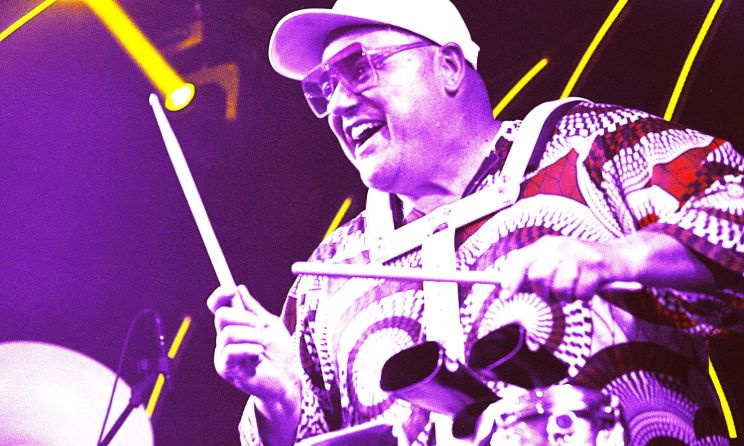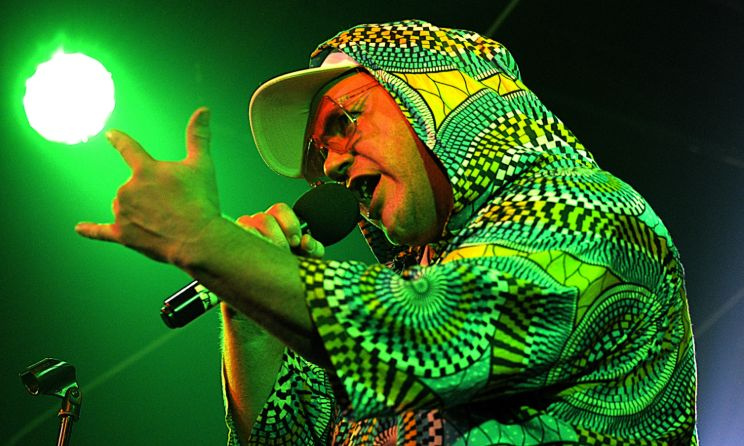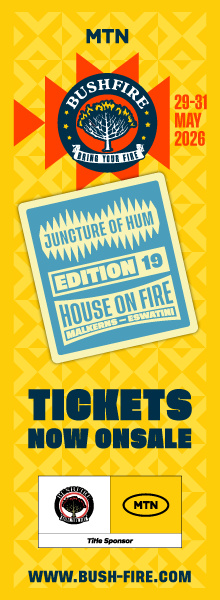Riaan van Rensburg - the man behind many bands
While watching Radio Kalahari Orkes recently I was struck by the style of the drummer, a large guy hunched over a tiny drum kit, with a huge grin emerging from under his baseball cap. He possessed the ability to both whack the skins with extreme power and caress them with incredible finesse. The next weekend I went to see the band Bombshelter Beast (they have two drummers) and there he was again, smiling while keeping time, but this time he also leapt to the stage front to deliver some stinging hard rap. I discovered that he also plays drums for top acts Albert Frost, Pieter Smith, Georgetown and Boo! I was intrigued. Why are so many bands using the same drummer?
 Riaan van Rensburg on a mobile percussion set-up at a recent Bombshelter Beast concert in Joburg. Photo: Jonathon Rees/Music in Africa
Riaan van Rensburg on a mobile percussion set-up at a recent Bombshelter Beast concert in Joburg. Photo: Jonathon Rees/Music in Africa Percussionist Riaan van Rensburg delivers some stinging rap at a recent Bombshelter Beast concert in Joburg. Photo: Jonathon Rees/Music in Africa
Percussionist Riaan van Rensburg delivers some stinging rap at a recent Bombshelter Beast concert in Joburg. Photo: Jonathon Rees/Music in Africa
I asked Bombshelter band leader Marcus Wyatt what it is that Riaan van Rensburg brings, why he chooses to work with him. “It’s his infectious energy. He’s a great drummer, a great musician, and, as we discovered recently, he’s also a great rapper. His positive outlook is what makes him such an asset to so many bands. That’s all you really want from the people you play with: you want to know that your music is safe with them, they have respect for it, and they are enthusiastic about it.”
Percussionist Steve Barnett, who played with Riaan many moons ago, replied to the same question with Riaan’s trademark saying: “Yes, yes, yes!” which is exactly how Riaan greeted me in our interview. Along with his obvious musical abilities, this triple affirmation is clearly what other musicians can’t help but respect and respond to.
The answer to the other question on my mind — why is Riaan so damn happy — soon became apparent. He grew up in a musical family; his father Johan was the band leader of Noot vir Noot, his mother is renowned Afrikaans singer Rina Hugo and his uncle Louis van Rensburg is also a multi-instrumentalist. Riaan began drumming almost as soon as he could walk, appearing on TV shows such as Noot vir Noot, Wielie Walie and Dis my Geheim from the tender age of four. He always knew what he wanted to do: play drums. If you knew what you wanted to do, then succeeded in making a living from doing it, wouldn’t you also be happy?
It turns out that Riaan has been playing for several bands simultaneously since he started studying music at Pretoria Technikon 30 years ago, where his uncle Louis started the music school. This was where he met a number of other prominent local musicians and built up a network he’s maintained to this day. Riaan started the band Jungabeez in his second year, and then teamed up with a bassist called Makati, who had the band Kwassa-Nkemba, who took him to Soweto for rehearsals — quite a cultural leap for the 18-year-old Afrikaans student.
He started listening to world music and playing gigs at clubs like 206 and The Bassline, where he heard African jazz and connected with musicians like Wyatt and Sean Fourie. “I decided there and then that I wanted to be able to play ALL types of music, and my studies went into a completely different direction; I became very interested in indigenous music.”
Riaan watched Louis Mhlanga’s band a lot, and then, when their drummer died, he started playing for them. He still plays with Mhlanga today. He learnt licks from Sipho Hotstix Mabusa and George Phiri, “who loved the fact that this young white guy could nail their beats, like mbaqanga”.
As he had learned to read and score music, and his ear had been trained, it helped him to play with so many acts. He also has a gift that enables him to listen to a piece of music once, and the second time he can play it from memory; and, if he can’t figure something out, he will go back and work it out. He learns the structures of song very quickly, and, after a rehearsal or two, he is ready to play with practically any band.
“I was mostly self-taught as a drummer, but funnily enough, I’ve learnt more from guitarists, who usually write the music, and they often sing the music to me before we play together, where I learn that they emphasise certain notes and play beats slightly differently.”
Jungabeez used to play at a lot of festivals, and he joined the drum circles at Rustler’s Valley, then got into working with the Drum Cafe crowd. “Dave Oldfield became a mentor to me, and took me into his family, where I met Wendy Oldfield too, and Steve Barnett. We would play sometimes for four hours without stopping — make a fire and just jam. I started attending workshops with master drummers from West Africa. Emmanuel Gomado had a brilliant system of teaching, which I loved, so I went up to the Odehe Dance Company Ghana.”
The first week in Ghana was hectic; Riaan caught malaria and nearly died. There were more trials when he recovered. “Learning to play is one thing, but to keep playing for hours requires building endurance. Playing with these guys is hardcore; it’s like the movie Whiplash. I’ve encountered this with many teachers: they get extremely angry with you, but if you walk away, it’s like you are walking away from your own instrument. So you have to decide, am I going to get it right?
“When you play with these Ghanians, you have to hold the rhythm for ages, then, when you are asked to solo, you have to be able to project above everyone else. This requires perfect technique; you get to a point where the technique projects the volume itself, and this takes time and experience. Sometimes the teachers deliberately try to knock you off the beat with their solos, but if you lose the beat, you may get a slap, and you don’t even know who it was that slapped you, they are so quick …”
Upon returning to South Africa, Riaan started making his own corporate work programme, then between 2003 and 2005 he went to London, where he gained experience working with kids, including kids in jail. Often there were not enough drums, so he encouraged the children to make instruments from junk. He did a workshop at Arthur Hull's Village Drumming, where he learned how to facilitate, use drums to communicate, build human potential and encourage participation.
Corporate work is something Riaan loves: “I start with an icebreaker; then, once I have their attention, I have to keep it. I use a call-and-response, and slowly make it more complex, and the corporate guys start responding — and the next thing, they are playing. There’s a huge sense of relief for people when they realise they can actually play a bit; even if they can’t really play, they can usually follow. Music has a healing energy, and drums bring this across at a very basic level. It gives people a sense of comfort, confidence and energy.
“There’s a sense of synergy that the drums bring, which is often what the management wants — to get their staff working together. Often the drums are used at an event, to start a day, or round a day off. I try to get the drumming done early, because it wakes people up.”
These days, aside from playing with many bands, Riaan is involved in multiple projects: “After London I did my debut album Dance Met My, where I did singing, rapping and covers; it was designed for a beer tent vibe. I learned how to make electronic music from my father, and I play with a lot of DJs here, and help them with beats. I love making electronic dance music.” In 2018 he made the trance album Travel Tunes.
“There was a rap song on one of my albums, which I played to Marcus, and he liked it. He’s always wanted me to do that rap song with Bombshelter Beast, and that night you watched me at [Randburg club] Sognage was the first time I’ve done it live; I was really nervous, actually!”
Well, I reckon he nailed it. Yes, yes, yes … He nailed it.
This story was first published by The Sunday Times.




















Comments
Log in or register to post comments